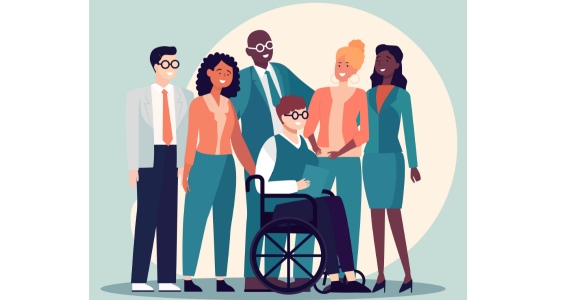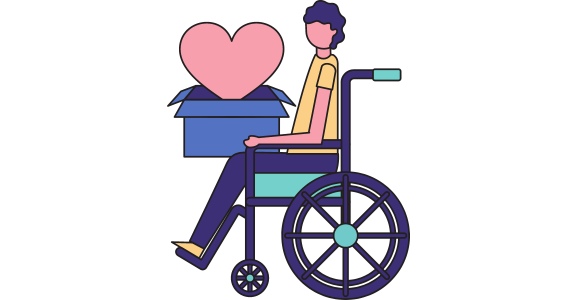According to the (WHO) World Health Organisation, nearly 1.3 billion are living with some disability worldwide. Despite being the largest minority group worldwide, individuals with disabilities have unemployment rates that are almost double as high as the normal population. People with disabilities might go through different challenges in navigating the employment industry.
Nevertheless, these obstacles can be attended to, and required work can be found with the rightful approaches and aid from disability employment services. In the blog below, we will examine multiple tactics and advice to assist job seekers with diverse disabilities in their pursuit of employment.
Addressing Different Types of Disability
It’s essential to recognise the wide range of disabilities before diving into advice on navigating the job market. Physical, sensory, mental, or intellectual disabilities are all possible.
The job poses unique obstacles and implications for each type of handicap. Job seekers must identify their unique skills and weaknesses and modify their job search tactics accordingly.

Understanding Your Rights and Resources
The first step is to educate yourself and stay aware of your rights and available resources. The government restrains discrimination against qualified individuals with disabilities in all aspects of employment. Familiarise yourself with its provisions and understand how they apply to your situation.
Many disability employment services (DES) organisations offer free support and guidance. These organisations can help you navigate the job search process, identify reasonable accommodations, and connect you with potential employers.
By collaborating with a DES provider, people can get access to various services to fit their particular requirements, improving their chances of landing a job.
Finding Your Strengths and Increasing Your Self-Belief
While a disability could limit you in some ways, it doesn’t limit your potential. Concentrate on determining which of your experiences, talents, and skills are most applicable to the job.
Many people with disabilities have remarkable intellectual, creative, or problem-solving abilities that they acquire by overcoming everyday obstacles.
Emphasise these strengths in your cover letter, CV, and interviews to boost your confidence.
Communicating Your Needs Effectively
Open and honest communication is crucial in securing employment with a disability. During the interview process, be prepared to discuss your disability and the reasonable accommodations you might require to perform the job successfully. Focus on how these accommodations will enable you to excel in the role, not on the disability itself.

Here are some tips for effective communication:
- Be proactive: Don’t wait for the employer to ask about your disability. Initiate the conversation after you’ve received a job offer but before your start date.
- Specificity is critical: Outline the specific accommodations you need, such as accessible workspace modifications, flexible work arrangements, or specialised software. Research potential solutions beforehand and be prepared to discuss them.
- Focus on functionality: Frame your request for accommodations by explaining how they will enable you to perform the job’s essential functions.
- Provide supporting documentation: If you have a doctor’s note or documentation outlining your disability and recommended accommodations, present them to the employer.
Consistently Ask for Reasonable Accommodations
In agreement with the legislation, eligible businesses must make reasonable accommodations for their disabled workers. If accommodations do not create an undue hardship or a direct threat, they are deemed “reasonable.”
To be eligible for adjustments, you must tell a potential employer—or your present employer—about your disability. Reasonable accommodations related to employment for individuals with disabilities consist of:
- Support for training or interviews
- Alterations to job duties or workplace conditions
- Possibilities for working remotely and flexible scheduling
- Changing the schedule and method of work completion
- Purchasing adapted equipment or assistive technology (such as software for speech recognition)
Embrace Self-Awareness and Advocacy
Be an advocate for yourself when requesting accommodations, and inform your employer of your condition.
Your employer will be better able to offer a supportive work environment if they have a deeper understanding of your needs and talents.
But self-awareness is also critical. Acknowledge your limitations and be receptive to acquiring new skills and adjusting to diverse work settings.
Identifying Helpful Work Environments
Although every workplace is unique, some value inclusion and diversity. Seek out organisations that have substantial initiatives to include people with disabilities or that are actively establishing an atmosphere that is both accessible and encouraging.

A company’s stance on disability employment can be investigated by visiting its websites, following it on social media, or going to job fairs where it actively seeks out diverse applicants.
Seek Professional Development Opportunities
Think of investing in professional courses by pursuing higher education, training programs, or certifications relevant to your career goals.
By continuously growing your skills and knowledge, you can expand your employability arena and open up new opportunities for growth in your chosen field.
Conclusion
Navigating employment with a disability may possess different obstacles, but with the appropriate strategies and support, individuals can overcome these challenges and thrive in the workplace.
By leveraging disability employment services, being aware of your rights, focusing on your strengths, and curating adaptive strategies, you can boost your chances of finding desired employment.
Remember to stay persistent, look out for support from your network, and keep investing in your professional training as you pursue your career goals.
With dedication and resilience, you can reach success in the workplace, irrespective of your disability.
See Also: The Importance Of Disability Awareness In Today’s Australian Society










